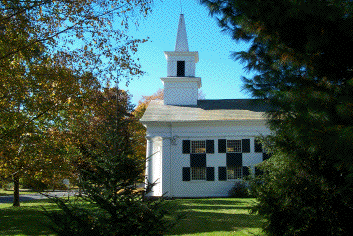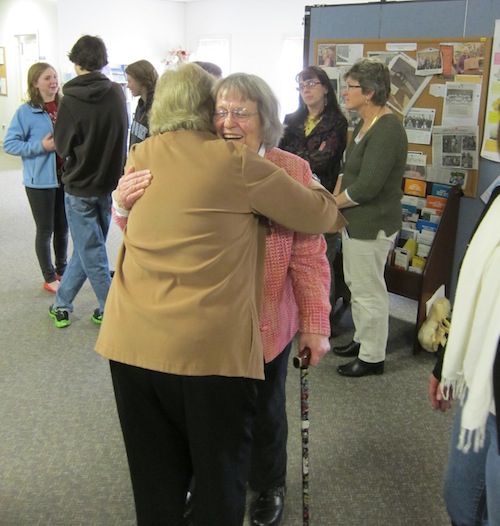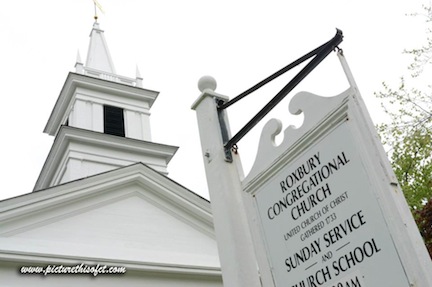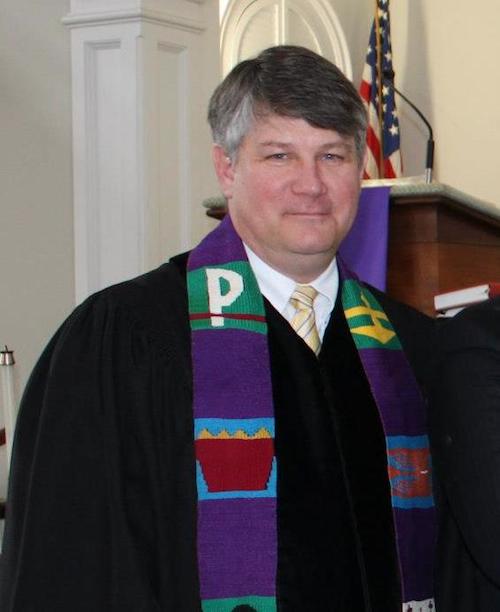GOOD FRIDAY
MEDITATIONS
Seven Last Words Meditation
GOOD FRIDAY
MEDITATIONS
Follow along with below with reflections on the Seven Last Words of Jesus.
(with gratitude to the Trinitarian Congregational Church, UCC in Norton, MA,
and the Rev. Bernie Hinckley)
The First Word:
“Father, forgive them; for they do not know what they’re doing.”
(Luke 23:34)

Copyright © 2007, Linda E. S. Roberts
Reflection
This day, as Jesus speaks his first word from the cross, we ponder the enormity of his grace. Before Jesus asks for anything for himself, he asks something for us: “Father, forgive them.” He preemptively forgives. Jesus forgives in order to get closer to us, in order to save us. He asks forgiveness, not as a strategy for a more fulfilling life but because, as the Son of God, Jesus knows it to be the very nature of God to forgive. “Father, forgive them. They do not know what they’re doing.”
Even when he is suffering on a cross, he is able to forgive. If Jesus can forgive in a time like this, then we should be able to forgive others even when we are hurt. Sometimes it hurts to give forgiveness and to receive forgiveness yet that is the point of the cross, after all. Jesus came so that we might be forgiven for our sins, so that we might be reconciled to God and to one another. Forgiveness allows us to turn our pains and hurts over to God so they do not consume and destroy the better part of ourselves.
Points to Ponder
Who is the first person you need to forgive? How can we forgive others if we can’t forgive ourselves? Why is it so hard to forgive ourselves? How often do you give and receive forgiveness? Have you ever had the experience of having someone forgive you when you didn’t ask for forgiveness? If we can’t forgive people the small hurts then how can we expect to forgive the really big ones? Do you really believe God has forgiven your sins? I define sin as the things we do or don’t do that keep us from being faithful on our walk with God. Do you take time on a regular basis to confess your sins so that you might enjoy the freedom of forgiveness? Do you need to experience God’s forgiveness in a fresh way today?
Prayer
Our Father who art in heaven, hallowed be your name, your kingdom come, your will be done, on earth as it is in heaven. Give us this day our daily bread. Forgive us our sins as we forgive those who sin against us. Save us from the time of trial and deliver us from evil. For the kingdom, the power and the glory are yours now and forever. Amen.
The Second Word:
“Truly I tell you, today you will be with me in Paradise.”
(Luke 23:43)

Copyright © 2007, Linda E. S. Roberts
Reflection
Having spoken to his heavenly Father, Jesus now speaks to a criminal. He bypasses the crowds and us and turns to the thief. As Jesus hung in agony upon the cross, there was no one beside him but two criminals. Jesus was mocked by the leaders and the soldiers. One of the criminals being crucified with him added his own measure of scorn. But the other crucified criminal sensed that Jesus was being treated unjustly. After speaking up for Jesus, he cried out, “Jesus, remember me when you come into your kingdom” (v. 42). Jesus responded to this criminal, “Truly I tell you, today you will be with me in paradise” (v. 43). When Jesus speaks of paradise, he is not talking so much of a place where they may go someday, but of the relationship that they entered today. How odd of Jesus to link a grand notion like “Paradise” with the horror that is his cross. You may not want a definition of “Paradise,” but here it is: Paradise is whenever, wherever you are with Jesus. “Today you will be with me in Paradise” is not some promise for a possibility in the distant future, but it is a promise of what Christ can be for us here and now. We shouldn’t speak of the afterlife but of eternal life, that life which is life with the living God, here, now.
Points to Ponder
How does this change your perspective on eternal life? How does this help us realize Jesus is with us right now?
Prayer
Dear Lord Jesus, we grumble when you received sinners, and ate with them. Now we might as well grumble, “The Savior receives sinners and dies with them.” But did you not say, “Where two or three are gathered in my name, I am there?” I always thought that you were talking about prayer or worship. If just two or three of us gather at Church on Sunday, you will be there. I never knew that you meant it about dying criminals gathered at Calvary. Where two or three good-for-nothing criminals are hanging out, like hanging on a cross, you are there! And so I pray: Jesus, remember me when you come into your kingdom! Jesus, remember me today as I seek to live within your kingdom! Amen.
The Third Word:
“Woman, here is your son.”
“Here is your mother.”
(John 19:26)

Copyright © 2007, Linda E. S. Roberts
Reflection
Family was always a problem for Jesus. “Family Values” as they are used today were not of great importance to him. As a baby, his paternity was in question, and his birth was an embarrassment for many. As a teenager, he had problems with parental authority. “Why were you searching for me? Did you not know that I must be in my Father’s house?” Luke 2:49 Or there was another time when someone said, “Your mother and your brothers and sisters are outside asking for you.” And he replied, “Who are my mother and my brothers?” Because he was obedient to the will of God, because Jesus did not waver from his God-ordained mission, he was a great pain to his family.
Yet Jesus speaks these words from the cross to his mother and an un-named disciple. Surely Jesus is saying more than, “John, do me a favor and look after Mom when I’m gone.” Jesus is saying, “Mother, I‘m giving you a new son. Son, behold your new mother.” Jesus, the one who so disrupted conventional families, is on the cross, forming a new family. In baptism, we are adopted into a family large enough to make our lives more interesting. Church is where we are thrown together with a bunch of strangers and are forced to call these people with whom we have no natural affinity, nothing in common, brother and sister. When Jesus gives us the commandment to “Love one another as I have loved you”, he is forming the first church, telling us to live as if these foreigners were our relatives. We who once only cared for people who have the same genetic material as us, now are made to care for those with whom we have nothing in common except Jesus. We keep having that experience of coming to call “brother/sister” someone whom we first thought to be just another stranger. It’s one of the gracious, demanding by–products of standing at the foot of Jesus’ cross. It’s called “the body of Christ.”
Points to Ponder
Faith begins with a question, the first question in the Bible. In the garden, God asks Adam, “Where are you?” This question is addressed to all of us every day. The Bible answers the first question with a second question in the Bible, which is asked in the aftermath of murder. When Cain kills Abel, God asks Cain, “Where is your brother?” We find out where we are, the first question, by discovering whether we care for others, the second question. Where are you? Where are your brothers and sisters?
Prayer
Lord Jesus, as I look around your creation, in the places I live, work and play, there are people I know all too well and others whom I hardly know. I pray O’ God, that you give me the grace to see these strangers as your siblings and therefore see them as mine. I pray that they will be given the grace to see you as a close relative. Remind me that Jesus, who had no conventional family, who had no children, is constantly forming the largest family the world has ever known. Amen.
The Fourth Word:
“My God, my God, why have you forsaken me?”
(Mark 15:34)

The Eleventh Station of the Stations of the Cross at Serra Retreat Center, Malibu, California.
Reflection
As Jesus was dying on the cross, he echoed the beginning of Psalm 22, which reads: “My God, my God, why have you forsaken me? Why are you so far from helping me, from the words of my groaning? O my God, I cry by day, but you do not answer; and by night, but find no rest.” (vv. 1-2) These words could be paraphrased as, “God, where are you when I need you?” Jesus knew and memorized scripture. Jesus is doing what we often do when we are at the end. When our sophisticated thoughts wither, we are forced by life to reach down into the recesses of memory. All we can remember is something buried deep within us from Childhood—the Lord’s Prayer, or Psalm 23. This is one reason the church should encourage people of all ages to read and memorize scripture. In those dark moments, when we are at the end of our rope and we can’t think, and most of what we once remembered has fled us, we need something that we know “by heart,” something that we can say without having to think about it. So Jesus repeats a prayer, a clinched fist prayer, that he learned as a child in religious school, a psalm of lament. “My God, my God, why have you forsaken me? Why are you so far from helping me, from the words of my groaning? O my God, I cry by day, but you do not answer; and by night, but find no rest.” It is interesting to note that Jesus did not ask God for deliverance but for presence. Jesus’ prayer was, “God, where are you?”
But we forget that the One who Jesus calls Father is not in heaven, sitting on a throne, preparing to swoop down and fix everything. The Father is there with the Son, hanging on a cross, now in intimate conversation with the Son, therefore not as the Son. We don’t want to hear such terrible, terrifying words, “My God, my God, why have you forsaken me,” because we don’t want to know that that’s the kind of God we’ve got, the kind of God who does not always work the world to our benefit, the kind of God who, when it gets dark, doesn’t immediately switch on the lights but rather comes and hangs out with us, on the cross, in the dark, and lets us in on the most intimate of conversations with the very heart of the Father, Son and Holy Spirit.
Listen to Jesus’ prayer, his nearly final prayer, and you can learn a great deal about an incredibly odd God. Earlier in his ministry his disciples asked Jesus, “Lord, teach us to pray like John taught his disciples.” And in response Jesus taught them a prayer. “Our Father who are in heaven . . .” Here, at the end, in the gathering dark, he teaches us another prayer: “Our Father, who art in hell . . .”
Points to Ponder
How many times have we wondered where God is? Do you find comfort in knowing that God is with us even in our darkest moments?
Prayer
O Lord Jesus, may I never forget that you are closer to me than I can possibly imagine. Help me to hear your still-speaking voice as you shepherd me through the valley of the shadows in my life. Help me to learn scripture so I may pray earnestly and honestly in all circumstances of life. Remind me that I can cry out to my Maker as you did. Help me to trust as you did, that God is with me no matter where I am. Amen.
The Fifth Word:
“I thirst.”
(John 19:28)

A painting of the Crucifixion, from a church in Taormina, Italy
Reflection
This is the first self-referential remark Jesus makes. “I thirst.” This fifth word is curious in light of Jesus’ repeated statements that he was the ultimate thirst quencher. “Whoever believes in me will never be thirsty, was a claim he made many times. (John 4:14; 6:35.) “If you are thirsty come to me,” he said, (John 7:37.) The thirst quencher is now thirsty! This “I thirst” must mean more than simply that Jesus was, after all, not only divine but also human. In saying, “I thirst,” we may be at the very heart of his divinity, that which makes Jesus God, one with the Father, and also very much like us. No doubt Jesus experienced extreme thirst while being crucified. He would have lost a substantial quantity of bodily fluid, both blood and sweat, through what he had endured even prior to crucifixion. Thus his statement, “I am thirsty” was, on the most obvious level, a request for something to drink. In response the soldiers gave Jesus “sour wine” (v. 29), a cheap beverage common among lower class people in the time of Jesus.
In the Bible, to “thirst” is usually for more than water. To thirst in Scripture is to yearn, to long for, to be desperate with desire. In his sermon on the mount, we hear of a blessing for a certain holy desperation. “Blessed are those who hunger and thirst for righteousness.” (Matt 5:6) Blessed are those who want God’s will to be done on earth as it is in heaven as if they were desperate for a drink of water after a week in the desert. The psalmist prays, “My soul thirsts for God, for the living God” (Psalm 42:2)
There is a parched thirst within us that will only be assuaged by God, the living God. In his deep anguish, in his thirsting, they offered him a sponge with vinegar on a stick. But Jesus was thirsty for more than water. Jesus had a deep, blessed thirst that God’s will be done on earth as it is in heaven, that God’s righteousness might be fulfilled to the brim, a holy thirst that could only be assuaged by lifting up the blood-red cup of salvation and drinking it with the dregs.
But maybe he wasn’t thirsty for water. Maybe he was thirsty for us. Isn’t that a summary of the Scripture - God’s got this thing for us? God is determined-through Creation, the words of the prophets, the teaching of the law, the birth of the Christ-to get close to us. God has this unquenchable thirst to have us!
Points to Ponder
How do you respond to Jesus’ statement “I thirst”? What do you thirst for? Write it down and pray about it. What does God thirst for? And how does this compare to what you thirst for?
Prayer
Dear Lord, in your words, “I thirst,” I hear the cry of my own heart. I too am thirsty, Lord, not for physical drink. I don’t need sour wine. Rather, I need the new wine of your kingdom to flood my soul. I need to be refreshed by your living water. I yearn for your Spirit to fill me now and every day that I walk with you. I thirst for you, O Lord, for you, as You thirst for me, for all people. Amen.
The Sixth Word:
“It is finished!”
(John 19:30)

Another station from The Stations of the Cross at Serra Retreat Center, Malibu, California.
Reflection
The sixth is a word of completion and resolution. These three words could be read as words of desperate surrender, of final relenting capitulation. “I give up.” It could be read that way. Perhaps we can hear this word in a different way. Maybe these are words of achievement and completion.
Jesus fought the good fight, and despite everything that has happened in the last 24 hours he has succeeded. He has done it. He did not say, “I am finished.” He said, “It is finished.” His work is done. We who live in a society of purpose-driven, goal-setting high achievers need to hear this. Jesus has done what we could not do. Because we could not get up to God, God climbed down to us, got down on our level, and here, in the bloody, unjust crucifixion, we have at last descended to our level. God has finished what God began. “It is finished.” What now is to be done by us? Nothing! What might we learn from the lessons of this day? Nothing! What are we suppose to do for God before nightfall? Nothing! Did you miss his words? “It is finished.” Jesus didn’t die as a frustrated, failed revolutionary. His death was the revolution. We know that nothing can separate us from God’s love. One day, what God has begun in us will also be finished, by his grace. Until that day, we live in the confidence of Jesus’ cry of victory: “It is finished!”
Points to Ponder
How do you feel knowing that there is nothing that you can do to earn your salvation? If Jesus has saved us, then what is our response to this act of salvation? How do you weave what Jesus has done into your daily life? What things in your life are incomplete? Have you considered how God could help you finish these projects? Do you have confidence that God will finish that which he has begun in you?
Prayer
How can I ever find words to express my gratitude to you, dear Lord Jesus? You did it. You finished that for which you had been sent, faithful in life, faithful in death. You accomplished that which no other person could do. Help me to live into this and accept your grace and give this grace away to others not for my sake but for the sake of your kingdom. Amen!
The Seventh Word:
“Father, into your hands I commend my spirit!”
(Luke 23:46)

Copyright © 2007, Linda E. S. Roberts.
Reflection
Now with this final word on Friday, Christ commits his life and his death to God. We are at the end. And at the end, as he breathed his last, Jesus resumes the conversation that he began with his Father. He began with, “Father forgive them.” Now he ends with the crucial words, “Into your hands I commend my spirit.” Jesus does in death what he did throughout his life, committed himself into the Father’s keeping.
So in commending his life to the Father, Jesus’ last word is a take-charge, direct strangely confident word. “Father into your hand hands I commend my spirit.” For these last hours Jesus has been arrested, tried, whipped, humiliated and mocked before a screaming crowd. But now, at the end of this day in which he has been used and abused, he takes charge, assumes command, unites with God with whom he always was in unity. “Father into your hands I commend my spirit.” Do not hear these words as relenting, or giving up. Jesus is commanding, commending, and committing, going head to head with the powers that be, and decisively taking charge. He takes his life out of the hands of his tormentors and places it confidently in the hands of his Father. He will not let his crucifiers have the last word or determine the significance of the cross.
His death is not a surprise to us. He predicted it in the Scriptures. It is not news that Jesus is dying. All humans die. And the words Jesus said and the deeds that he did, you had to know that he would die at the hands of those whom he had offended. So his death is not a surprise. It is the way that he died that makes this a stunning moment. It is not simply that he died in horrible agony upon the cross. This is the way the world treats its prophets and its saints. What he teaches us is this: that there is a way to live and to die.
Points to ponder
It can be a fearful thing to commend our spirits to God because, well, who knows what God will do with our lives? If you have commended your life to God on Sunday morning, only to be shocked and dismayed by what God commanded you to do on a Monday morning, you understand this. Our only reassurance from God is the promise that God will never allow anything worse to happen to us than what happened to his only Son.
Prayer
O God, we have heard Jesus’ last word. Now we pray Holy God, that we might have the grace, and the faith too, to make it our first word every day, “Father into your hands . . . “ Amen.
Roxbury Congregational Church
United Church of Christ
24 Church Street
Roxbury, CT 06783-1703
Office: 860-355-1978
email Church Office / Secretary
Sundays
In-Person and Virtual
see the worship tab for virtual connection options
Sunday Worship
September through June: 10:30 am.
(July & August: 9:30 a.m.)
The Meetinghouse and Fellowship Hall are air-conditioned.
Handicap accessible - ramp in the rear of the parking lot.
Refreshments and Conversation: after worship
Church Office hours:
Thursdays and Fridays 9:30 am. - 12:30 pm.

Quick Link
our, twice-weekly email, with a devotional, calendar, and prayers)
(and click "Like")
and the LSA Facebook page
Southern New England Conference, UCC News
About Roxbury Congregational Church
Come to the About Us section to meet, and find out what we're all about!

We Welcome Our Guests and Invite You To Join Us!
If you're curious about what a truly nurturing community of believers is like, and what to expect when you attend worship, then you should come to the Guest page.
A Welcome note from our Minister.
Wondering What It Means To Be a Member of This Church?

What is the United Church of Christ (UCC)?
Find out about the United Church of Christ (UCC) and the history of this Mainline Protestant denomination on our What is the UCC page.

Rev. David F. Peters, Minister
Website c. 2023 Roxbury Congregational Church, United Church of Christ, Roxbury, Connecticut, USA
Members Login
